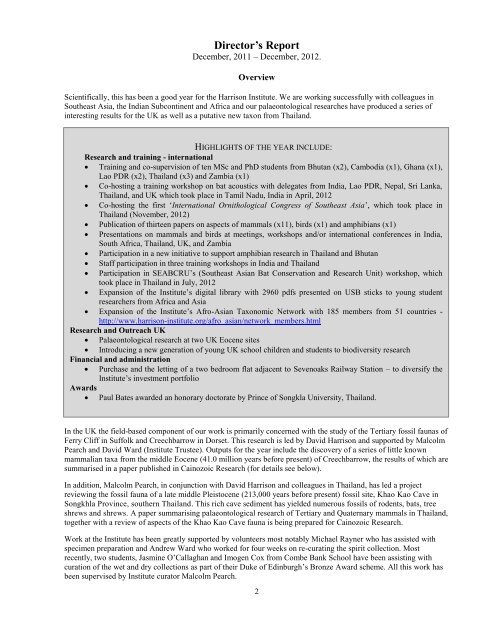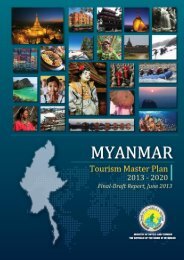Harrison Institute
2011-2012 - Harrison Institute
2011-2012 - Harrison Institute
You also want an ePaper? Increase the reach of your titles
YUMPU automatically turns print PDFs into web optimized ePapers that Google loves.
Director’s Report<br />
December, 2011 – December, 2012.<br />
Overview<br />
Scientifically, this has been a good year for the <strong>Harrison</strong> <strong>Institute</strong>. We are working successfully with colleagues in<br />
Southeast Asia, the Indian Subcontinent and Africa and our palaeontological researches have produced a series of<br />
interesting results for the UK as well as a putative new taxon from Thailand.<br />
HIGHLIGHTS OF THE YEAR INCLUDE:<br />
Research and training - international<br />
Training and co-supervision of ten MSc and PhD students from Bhutan (x2), Cambodia (x1), Ghana (x1),<br />
Lao PDR (x2), Thailand (x3) and Zambia (x1)<br />
Co-hosting a training workshop on bat acoustics with delegates from India, Lao PDR, Nepal, Sri Lanka,<br />
Thailand, and UK which took place in Tamil Nadu, India in April, 2012<br />
Co-hosting the first ‘International Ornithological Congress of Southeast Asia’, which took place in<br />
Thailand (November, 2012)<br />
Publication of thirteen papers on aspects of mammals (x11), birds (x1) and amphibians (x1)<br />
Presentations on mammals and birds at meetings, workshops and/or international conferences in India,<br />
South Africa, Thailand, UK, and Zambia<br />
Participation in a new initiative to support amphibian research in Thailand and Bhutan<br />
Staff participation in three training workshops in India and Thailand<br />
Participation in SEABCRU’s (Southeast Asian Bat Conservation and Research Unit) workshop, which<br />
took place in Thailand in July, 2012<br />
Expansion of the <strong>Institute</strong>’s digital library with 2960 pdfs presented on USB sticks to young student<br />
researchers from Africa and Asia<br />
Expansion of the <strong>Institute</strong>’s Afro-Asian Taxonomic Network with 185 members from 51 countries -<br />
http://www.harrison-institute.org/afro_asian/network_members.html<br />
Research and Outreach UK<br />
Palaeontological research at two UK Eocene sites<br />
Introducing a new generation of young UK school children and students to biodiversity research<br />
Financial and administration<br />
<br />
Awards<br />
<br />
Purchase and the letting of a two bedroom flat adjacent to Sevenoaks Railway Station – to diversify the<br />
<strong>Institute</strong>’s investment portfolio<br />
Paul Bates awarded an honorary doctorate by Prince of Songkla University, Thailand.<br />
In the UK the field-based component of our work is primarily concerned with the study of the Tertiary fossil faunas of<br />
Ferry Cliff in Suffolk and Creechbarrow in Dorset. This research is led by David <strong>Harrison</strong> and supported by Malcolm<br />
Pearch and David Ward (<strong>Institute</strong> Trustee). Outputs for the year include the discovery of a series of little known<br />
mammalian taxa from the middle Eocene (41.0 million years before present) of Creechbarrow, the results of which are<br />
summarised in a paper published in Cainozoic Research (for details see below).<br />
In addition, Malcolm Pearch, in conjunction with David <strong>Harrison</strong> and colleagues in Thailand, has led a project<br />
reviewing the fossil fauna of a late middle Pleistocene (213,000 years before present) fossil site, Khao Kao Cave in<br />
Songkhla Province, southern Thailand. This rich cave sediment has yielded numerous fossils of rodents, bats, tree<br />
shrews and shrews. A paper summarising palaeontological research of Tertiary and Quaternary mammals in Thailand,<br />
together with a review of aspects of the Khao Kao Cave fauna is being prepared for Cainozoic Research.<br />
Work at the <strong>Institute</strong> has been greatly supported by volunteers most notably Michael Rayner who has assisted with<br />
specimen preparation and Andrew Ward who worked for four weeks on re-curating the spirit collection. Most<br />
recently, two students, Jasmine O’Callaghan and Imogen Cox from Combe Bank School have been assisting with<br />
curation of the wet and dry collections as part of their Duke of Edinburgh’s Bronze Award scheme. All this work has<br />
been supervised by <strong>Institute</strong> curator Malcolm Pearch.<br />
2



